
Alphabetical Menu
Chronological Menu
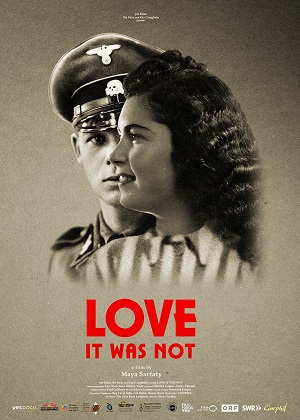
Love It Was Not sheds light on the romance between Helena Citron, a Jewish prisoner during the Holocaust, and an SS officer, Franz Wunsch, who worked as a guard at the concentration camp in Auschwitz. They met and fell in love at Auschwitz, but this documentary by director Maya Sarfaty questions whether or not their relationship was actually based on love. Using archival footage, images and interviews with Helena Citron and her sister, Roza, as well as Helena's fellow female prisoners whom Wunsch also saved, Sarfaty takes the seemingly simple story and shows how complex and even complicated it actually is, especially after Helena moved to Israel and agreed to testify in the trials against Wunsch. The dynamics between her and Roza are also interesting and complex. Sarfaty does a great job of hooking the audience right away and preparing the audience for what's to come within the first few minutes passing a photo of Helena Citron looking unexpectedly great and smiling while wearing her prison uniform as those related to her comment on the mysterious photo. That photograph is just the tip of the iceberg of Wunsch and Citron's relationship and leaves many questions. Fortunately, Love It Was Not answers those questions so that by the time the doc ends, you'll see that photo from an entirely different perspective. Sarfaty's access to the archival material is among the film's strengths as are the candid, insightful interviews. She shows some of the horrors from the concentration camp without dwelling on it which is understandable those horrors aren't what the film is really about. The doc doesn't feel dry nor dull because the story of Helena's romance with Franz remains provocative from start to finish. Their story has enough drama, thrills, suspense and twists to turn it into a Hollywood romance/thriller, although, to be fair, the doc's blunt title is somewhat of a spoiler. That cinematic aspect of this doc makes it rise above your average doc, and it's easy to forget that you're watching a documentary because it's such a compelling story. At a running time of merely 1 hour and 26 minutes, Love It Was Not is thoroughly captivating, suspenseful and provocative. It opens at Quad Cinema via Greenwich Entertainment. The Beta Test 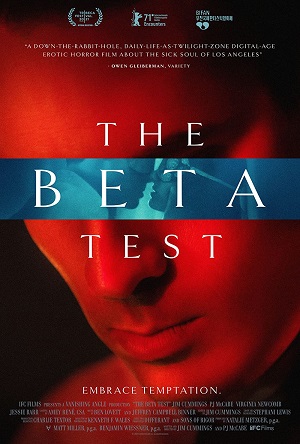 Jordan (Jim Cummings), a Hollywood agent engaged to Caroline (Virginia Newcomb), receives a fancy purple envelope inviting him to a hotel for an anonymous sexual encounter while blindfolded. He yields to temptation, but the encounter doesn't quite go as he expected, leaving Jordan desperate to know the identity of the woman in the hotel room, of who sent him the invitation and why. He becomes abusive toward his fiancée and behaves paranoid as he suspects that something much more sinister might be going on. Meanwhile, he confides in his friend and coworker, PJ (PJ McCabe), who helps him to investigate the mysterious purple envelope. Like Eyes Wide Shut, The Beta Test is more about love, trust and fidelity than about the mystery in its twisty plot. Both films are mindfucks, but the similarities to Eyes Wide Shut end there.The screenplay by writer/director Jim Cummings and co-writer/director PJ McCabe has more satire, dark comedy and less room for interpretation than Kubrick's film. It opens with a prologue where a husband murders his wife after she admits that she's unhappy with their marriage. That prologue provides a foreshadow of the dark territory that The Beta Test will head towards. Jordan's character is like nails-on-a-chalkboard, though. He's cocky, manic, and narcissistic, so he's far from a decent human being. What does Caroline even see in him? How he treats security men at his apartment building so rudely just to get camera footage from him says a lot about what kind of an inconsiderate and obnoxious person Jordan is.The third act has some surprising revelations and twists that won't be spoiled here. That's when the film makes it clear what messages and critiques of modern society that it wants the audience to ponder. It's far from subtle and becomes slightly overwrought with some on-the-nose dialogue, and it's not as ballsy or shocking as the ending in one of the best 90's paranoid thrillers, Arlington Road, which is much, much darker and bolder this film. To be fair, though, The Beta Test defies genre; it's hard to classify it is just a paranoid thriller because it ends up being more than that. It even has shades of Alice in Wonderland and The Player. Jim Cummings gives a solid, over-the-top performance. He's lucky to be a charismatic actor because tha charisma is one of the few things that makes the character of Jordan remotely bearable to the audience. Otherwise, Jordan would be merely annoying and completely unbearable. It's interesting how Cummings doesn't veer into campiness, although he comes close to it at times. The production design including the editing and cinematography add some style to the film. Fortunately, at a running time of 1 hour and 33 minutes, The Beta Test doesn't overstay its welcome nor does it become exhausting like it could have if it went on 30 minutes longer. The Beta Test is ultimately razor-sharp, suspenseful and provocative. It's one of the best Hollywood satires since The Player. 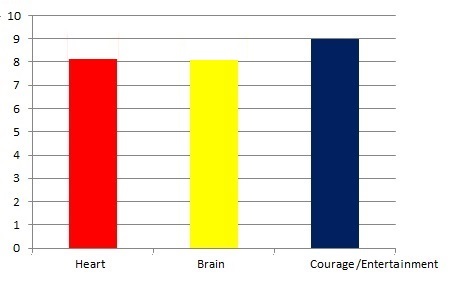 Dangerous 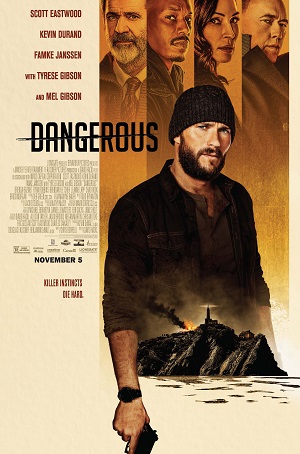 Dylan Forrester (Scott Eastwood), an ex-con out on parole, sees a psychiatrist, Dr. ALderwood (Mel Gibson), who hooks him up with medication to treat his antisocial personality disorder. Upon learning that his brother died, he travels to Guardian Island for his funeral, and investigates his mysterious death. Meanwhile, FBI Agent Shaunessy (Famke Janssen), who suspects him of murder, tries to hunt him down. He also has to deal with Sheriff McCoy (Tyrese Gibson) and to defend himself against Cole (Kevin Durand) who has a hidden motive on the island. The screenplay by Christopher Borrelli is a mess, and not a fun or hot one. Very little makes sense as the plot becomes increasingly convoluted and preposterous. Borrelli doesn't even establish the relationship between Dylan and his brother nor are there any flashbacks. It's more concerned about moving the plot from Point A to Point B, but it does that with clunky exposition and very little suspense which eventually leads to lethargy. The more the plot progresses, the less it becomes interesting. The characters are one-note, cartoonish and forgettable. If it were remotely exciting, campy or funny, Dangerous would've at least been a dumb guilty pleasure, dumb B-movie instead of a painfully dull one that just goes through the motions while barely entertaining the audience. Unfortunately, the action scenes are poorly choreographed and feel tedious, so Dangerous doesn't even entertain on a visceral level. The performances are mediocre at best, but, to be fair, the stilted, lifeless screenplay fails to breathe life into their roles anyway, so they don't have much to work with. Is it too much to ask for filmmakers to treat characters like human beings? Even the scenery of the island isn't used effectively enough to add any visual style. Without style or substance, Dangerous is a chore to sit through. If only it had bad laughs to make it more lively and invigorating. At a running time of 99 minutes, which feels more like 3 hours, it's a painfully dull, preposterous and asinine B-movie that sorely lacks thrills, suspense and even a shred of plausibility. 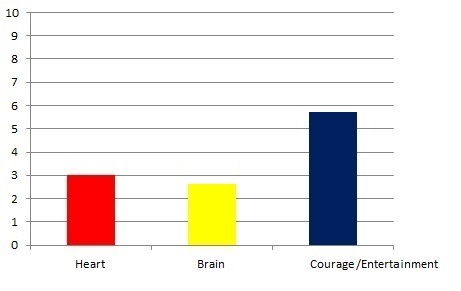 Eternals 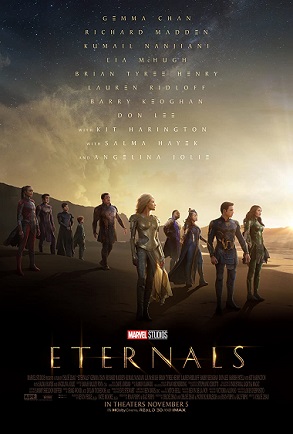 Thousands of years ago, a Celestial tasked the Eternals, an immortal race, with protecting the human race from predators known as Deviants. The Deviants show up on Earth and pose a threat to the humans. The Eternals, an immortal race, come together to battle the Deviants. Ajak (Salma Hayek), the Eternals' leader, joins forces with the other Eternals, Sersi (Gemma Chan), Kingo (Kumail Nanjiani), Sullen Druig (Barry Keoghan), Sprite (Lia McHugh), Ikaris (Richard Madden), Makkari (Lauren Ridloff), Phastos (Brian Tyree Henry), Thena (Angelina Jolie) and Gilgamesh (Don Lee), on a mission to save the human race. Writer/director Chloé Zhao along with co-writers, Ryan Firpo, Kaz Firpo and Patrick Burleigh treat the characters like human beings and develop their relationships, personalities and feelings. They provide the characters with enough space to express their emotions and to build a rapport with others. Without revealing any spoilers, some of the characters even get a chance to cry which is something that's rarely seen in a superhero movie these days. A film, after all, is not just about its plot, but the emotions contained within it which are intangible. There's just enough action, but not so much that it overwhelms and exhausts the audience like in The Suicide Squad. One of the best scenes in the film is a simple one without action when the Eternals gather to eat with Gilgamesh. The dialogue during that scene as well as the tone as well as the humanity truly shines through there. The way the screenwriters incorporate exposition and introducing is also commendable, although there are a few scenes early on that feel contrived because they're merely there for exposition. Fortunately, there's just enough exposition so that the audience doesn't become confused about who's who. With so many characters, it would've been easy to confuse the audience with a less expositional screenplay. Also, the use of comic relief works very well with some witty and humorous lines, so Eternals, unlike the very dull Black Widow and Dune, knows when not to take itself too seriously. Everything that Black Widow and Dune lacks, Eternals has, for the most part. The action scenes are thrilling while the story remains suspenseful without veering into tedium. Some scenes feel uneven, but that's not enough to sink the film or to take away from its dramatic momentum. The biggest surprise, though, is that >Eternals remain grounded in humanism that it's unafraid to display. By treating the characters as human beings, Zhao treats the audience as human beings, too, which is a major feat. When it comes to the visual effects, Eternals has stunning CGI and, most importantly, action scenes that don't resort to shaky cam or choppy editing like in the nauseatingly shot Snake Eyes; G.I. Joe Origins. Much of the breathtaking cinematography helps to make the film look and feel epic in scope while keeping audiences exhilarated. The performances are pretty solid and the actors and actresses are well-cast, especially Lia McHugh who's as memorable here as Millicent Simmonds is in A Quiet Place: Part II. Kumail Nanjiani is also terrific and has great comedic timing. The pace moves quickly enough, although, admittedly, the lengthy running time does begin to weigh down on the film a little around the 2-hour mark, but not as much as in Dune because Eternals succeeds in engaging the audience on an emotional level instead of just entertaining their eyes and ears. Eternals recognizes that the audience has a heart and soul, although it's not very thought-provoking so it doesn't engage the mind that much. For a sci-fi action thriller that does cater to the audience's heart, mind and soul concurrently, see the recent anime film The Laws of the Universe: The Age of Elohim which actually has wise life messages to be inspired by. At a running time of 2 hours and 37 minutes, Eternals is one of the most humanist MCU movies ever made. It's an exhilarating, suspenseful and visually dazzling spectacle with a surprisingly warm, beating heart. 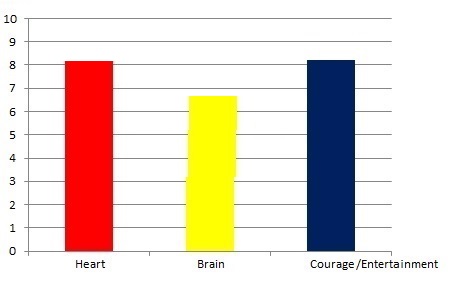 A Gift From Bob 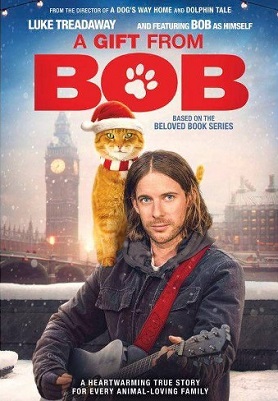 James Bowen (Luke Treadaway), a successful author, recalls a Christmas from his past when he struggles to make ends meet while busking on the streets of London with his cat, Bob, and works at a charity with Bea (Tonteri-Young). Two animal welfare officers, Leon (Tim Plester) and Ruth (Pepter Lunkuse) threaten to take Bob's beloved cat away from him. Based on the books A Gift From Bob and The Little Book of Bob by James Bowen, The screenplay by Garry Jenkins doesn't offer anything new or surprising, and the ending can be seen from a mile away, but it doesn't pander to the lowest common denominator or to little kids. Both kids and adults will find something to be entertained by, although it helps if you're a cat lover. If you enjoyed the first film, A Streetcat Named Bob, chances are that you'll enjoy this one too. The villains, animal welfare officers, aren't too scary. They're pretty harmless, but also a bit one-dimensional which means there's not much tension or suspense with that subplot. Perhaps the true villain is poverty itself, but even then the film doesn't show James' struggles with poverty unflinchingly. It's about as dark as a Charles Dickens narrative like Scrooge or Frank Capra's family-friendly classic It's a Wonderful Life which is the tone and balance between lightness and darkness that A Gift From Bob aims for and finds, for the most part. There are some heartbreaking moments, but nothing too emotionally devastating. A Gift From Bob lacks the wit found in Peter Rabbit, though, but it does have a big heart and isn't afraid to display it. It doesn't ask for much from the audience except for them to watch the film with an open heart. Luke Treadway gives a moving performance, but it's really the cat who steals the show like it did in the previous film. Fortunately, the cat is real, not CGI, which helps a lot unlike in The Call of the Wild. The bond between Bob and James feels just as palpable and poignant as it did in A Streetcat Named Bob. There are also some positive messages about kindness, hope, friendship and compassion that's not only inspiring messages for the holidays, but any time of the year as well, for everyone young and old. The film moves along at a brisk enough pace and doesn't have any scenes that drag. At a running time of 1 hour and 32 minutes, A Gift From Bob is a sweet, charming and heartwarming movie for the whole family.
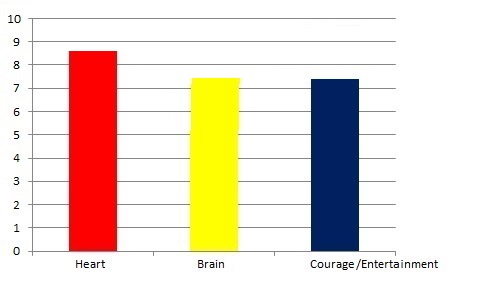 Hell Hath No Fury 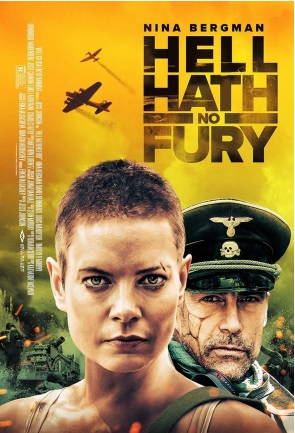 In August 1944 at the end of WWII, Marie DuJardin (Nina Bergman), a French national considered a traitor by her country, gets captured by U.S. soldiers. She strikes a deal with Major Maitland (Louis Mandylor) to attain her freedom and for the sake of her own survival. If she leads the soldiers to a stache of gold, they'll set her free. The Nazis and the French Resistance also hunt for the gold. Meanwhile, Marie has a romance with a SS officer, Von Bruckner (Daniel Bernhardt). Hell Hath No Fury is what Inglourious Basterds would've looked like if it took itself a little bit more seriously without trying too hard to be please the audience or by going over-the-top. Screenwriter Katharine Lee McEwan should be commended for writing a female lead who's not just physically strong, but strong emotionally too. Marie has been through a lot, yet she persists and doesn't give up. She's also clever and skilled when it comes to defending herself with violence. What could've turned into a non-stop action film instead turns into a more complex story because it's not just about the search for gold. Yes, the gold is a MacGuffin, but what Marie truly wants is freedom. To get there, it's not easy, and her relationship with the SS officer complicated matters. Fortunately, their romance doesn't make the film feel uneven. Hell Hath No Fury doesn't focus that much on their relationship for that matter and it doesn't really need to. What's missing, though, is some comic relief to provide some much-needed levity. Katharine Lee McEwan and director Jesse V. Johnson at least manage to grasp the concept that less is more. There's no over-explaining and there's just the right amount of exposition to keep the audience from being confused, so the film remains lean without dullness or lethargy seeping in. Nina Bergman gives a breakthrough performance as Marie DuJardin. She's just as memorable as Charlize Theron is in Mad Max: Fury Road. Daniel Bernhardt is also well-cast and brings charisma to his role. Director Jesse V. Johnson doesn't shy away from showing the gritty violence with all of its gore during the action scenes, so this isn't one of those action films that resorts to shaky cam to try to lessen the gruesomeness. The gore is indeed gruesome and icky, and that's the point. It should make you feel disgusted and repulsed which is what it succeeds in accomplishing. That physical grittiness makes the film more grounded in realism while also much more intense. At an ideal running time of 1 hour and 34 minutes, Hell Hath No Fury is a rush of pure adrenaline. It's exhilarating, gripping and unflinchingly gritty. 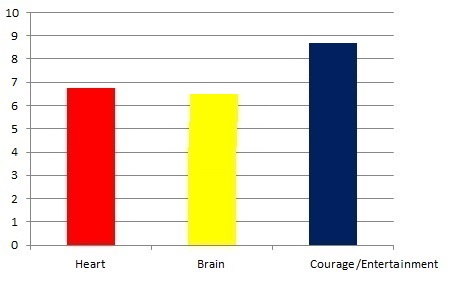 Hive  Fahrije (Yllka Gashi) works as a beekeeper while raising her two children, Zana (Kaona Sylejmani) and Edon (Mal Noah Safqiu), and taking care of her father-in-law, Haxhi (Çun Lajçi), in the village of Krusha. She awaits the news of the whereabouts of her husband who went missing during the Kosovo War in 1999. After donations from a women's organization wane, she struggles to make ends meet, so she gets a driver's license, a car and starts a business making and selling ajvar, a roasted red pepper spread, in jars. Writer/director Blerta Basholli has woven an engrossing story about a woman who dares to become independent and rise above adversity. It's rooted in tragedy, specifically the horrors of the Kosovo War, but Basholli doesn't dwell on it nor does she use flashbacks. The war serves as an integral backstory, though, and it's clear from the very beginning that it haunts Fahrije on an emotional and psychological level. She's a brave and strong character who remains unafraid to go against the grain and to take risks. It's refreshing to see such a complex and inspirational human being on screen. Basholli wisely avoids schmaltz and contrivance while grounding the film in realism. Every scene rings true, and there are just enough understated and nuanced moments. Fahrije isn't perfect--even her business isn't perfect either, initially, because her jars don't even have a label on them, so they don't sell well. She also goes through some setbacks when someone breaks many of her ajvar jars, but what she does after noticing the damage, which won't be spoiled here, speaks volumes about the kind of person that she is and sends a positive message to anyone who's ever had to deal with setbacks in life. The messages in Hive are profound and meaningful, and they're presented in a way that's never preachy nor heavihanded thanks to the sensitive screenplay that has shades of Ken Loach's social realism. Ylkka Gashi gives a wonderful, nuanced performance as Fahrije. With her warmth and charisma, tackles the complex role effectively by displaying Fahrije's innate strength and fragility at the same time. Through her performance, you can grasp that Fahrije feels sad and angry--which she has every right to be--while she's concurrently hopeful, courageous and optimistic. Basholli also does a great job of incorporating metaphors into the film, i.e. the beekeeping and the ajvar. Both of those involve processes that result in something useful and flavorful---or in the case of the bees coming together to make honey, the end result is something sweet. That provides that film with visual poetry and some food for thought, no pun intended. At a brief running time of 1 hour and 24 minutes, Hive is genuinely poignant, tender and inspirational. 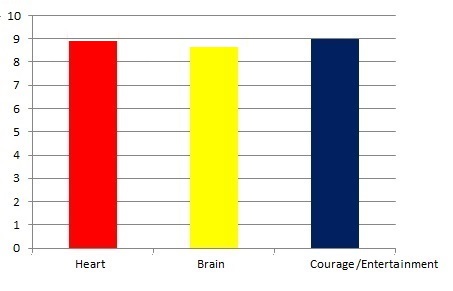 Spencer  Prince Diana (Kristen Stewart) reluctantly spends three days at the Queen's Sandringham Estate with her two sons, William (Jack Nielen) and Harry (Freddie Spry) to celebrate Christmas. She struggles loneliness while processing the fact that her husband, Charles (Jack Farthing), cheats on her with his mistress, Camilla Parker Bowles (Emma Darwall-Smith). Major Alistar Gregory (Timothy Spall), a Scottish army veteran working for the royals, keeps an eye on her, but her only confidante is her dresser, Maggie (Sally Hawkins). Spencer doesn't take the conventional biopic approach by any means. Screenwriter Steven Knight merely focuses on a few days in the life of Princess Diana at Sandringham Estate while she's haunted by her past and deals with the consequences of her marital problems. It's an immersive, emotional journey into the unstable mind of a fragile human being who feels trapped and desperately wants to escape from her suffocating environment. In a sense, Spencer is a prison break movie, but not in the traditional sense because Princess Diana is an emotional prison. She comes across as like a teenager and behaves immaturely. From the very few minutes, you learn a lot about her: she has no shame in showing up late to Sandringham Estate and gets lost while driving on the way there. She's a mess, but one that's captivating to watch because she's so flawed, complex and unpredictable which makes her all the more compelling as well as human. Knight doesn't shy away from providing many glimpses of Princess Diana behind the curtain, so-to-speak. There's a voyeuristic aspect to the film as though because you're essentially watching her during her private moments, even when she's vomiting into the toilet or harming herself with garden clippers. Very little happens plot-wise, but like a lot of great films, Spencer isn't really about its plot. A lot goes on both on the surface and beneath the surface because Spencer is ultimately a dark psychological character study. Kristen Stewart gives a raw, transcendent performance as Princess Diana. She transforms into that character so much that you forget you're watching Kristen Stewart. It's not an imitation of Diana; she becomes her. Kristen Stewart gives the best performance of her career and deserves an Oscar for tackling the dark side of Princess Diana's humanity with such utter conviction. Diana is suffering from a lot of emotional pain, and Stewart captures that emotional pain unflinchingly. Interestingly, director Pablo Larraín films the movie like a horror film. Even the music score has the nervous tension that you'd expect from a horror film, much like in Shiva Baby. The cinematography, though, is breathtakingly exquisite with so many poetic shots. The costume design also looks wonderful as does the set design and lighting, so Spencer certainly has plenty of style to offer. It's just as visually stylish as The Favorite and I Am Love. No matter how hard you try, you can't look away from the screen because it looks so beautifully shot, like a painting with a lot for the spectator to observe and contemplate all of the poetry. Larraín also makes great use of the song "All I Need is a Miracle" by Mike & the Mechanics in a cathartic scene that's among the film's many memorable ones. At a running time of 1 hour and 51 minutes, Spencer is a triumph. It's a spellbinding psychological journey into the heart, mind and soul of a troubled human being who yearns to break free. Spencer would make an interesting double feature with Swallow, Safe and Shirley Valentine, because they're also portraits of women who go through psychological journeys while trying to escape from an emotional prison. 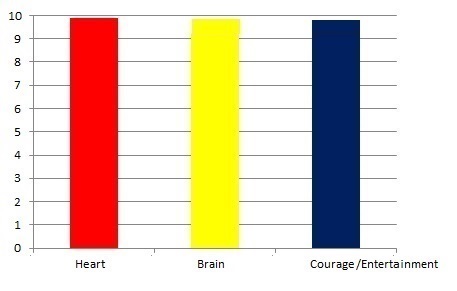 |